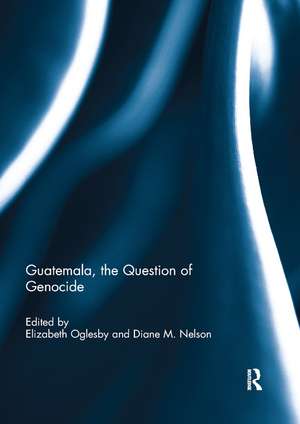Guatemala, the Question of Genocide
Editat de Elizabeth A. Oglesby, Diane M. Nelsonen Limba Engleză Paperback – 13 dec 2019
In this volume, Guatemalan and international scholars rigorously explore the complexities of the Guatemala experience and reflect upon the case's implications for understanding and prosecuting the category of genocide more broadly. Topics include: the nexus of racism and counterinsurgency in explaining Guatemala's genocide; the politics of Maya collective memory; the intersections of gender, sexuality, and ethnicity in genocide; the decades-long interconnections of national and transnational justice processes that brought the case to trial; and the limits and contributions of tribunal justice.
This book was originally published as a special issue of the Journal of Genocide Research.
Preț: 389.70 lei
Nou
Puncte Express: 585
Preț estimativ în valută:
74.57€ • 78.02$ • 61.94£
74.57€ • 78.02$ • 61.94£
Carte tipărită la comandă
Livrare economică 03-17 aprilie
Preluare comenzi: 021 569.72.76
Specificații
ISBN-13: 9780367891459
ISBN-10: 036789145X
Pagini: 264
Dimensiuni: 174 x 246 x 15 mm
Greutate: 0.45 kg
Ediția:1
Editura: Taylor & Francis
Colecția Routledge
Locul publicării:Oxford, United Kingdom
ISBN-10: 036789145X
Pagini: 264
Dimensiuni: 174 x 246 x 15 mm
Greutate: 0.45 kg
Ediția:1
Editura: Taylor & Francis
Colecția Routledge
Locul publicării:Oxford, United Kingdom
Public țintă
PostgraduateCuprins
1. Introduction: Guatemala’s genocide trial and the nexus of racism and counterinsurgency Elizabeth Oglesby and Diane M. Nelson 2. From heaven to hell in ten days: the genocide trial in Guatemala Jo-Marie Burt 3. Bonesetting: the algebra of genocide Diane M. Nelson 4. International accompaniment, reflexivity and the intelligibility of power in post-conflict Guatemala Etienne Roy Grégoire and Karen Hamilton 5. Surviving in the margins of a genocide case in the making: recognizing the economy of testimony at stake in research on political violence Karine Vanthuyne and Ricardo Falla 6. Perpetrators: specialization, willingness, group pressure and incentives. Lessons from the Guatemalan acts of genocide Manolo E. Vela Castañeda 7. ‘Our ongoing fight for justice’: the pasts and futures of genocidio and justicia in Guatemala Heather A. Vrana 8. Carrying a heavy load: Mayan women’s understandings of reparation in the aftermath of genocide Alison Crosby, M. Brinton Lykes and Brisna Caxaj 9. Peace without social reconciliation? Understanding the trial of Generals Ríos Montt and Rodriguez Sánchez in the wake of Guatemala’s genocide Roddy Brett 10. ‘The realities of power’: David Stoll and the story of the 1982 Guatemalan genocide Marc Drouin 11. The reconciliation trap: disputing genocide and the land issue in postwar Guatemala Berthold Molden 12. Waging peace: a new generation of Ixiles confronts the debts of war in Guatemala Krisjon Olson 13. The Ríos Montt case and universal jurisdiction Amy Ross
Notă biografică
Elizabeth Oglesby is Associate Professor of Latin American Studies and Geography at the University of Arizona, USA. She has worked in Guatemala since 1986 and is co-editor of The Guatemala Reader: History, Culture, Politics. In 2013, she testified as an expert witness in the Guatemala genocide trial.
Diane Nelson is a cultural anthropologist at Duke University, USA, and has worked in Guatemala since 1985. Her books include Who Counts: The Mathematics of Death and Life After Genocide; Reckoning: The Ends of War in Guatemala; and A Finger in the Wound: Body Politics in Quincentennial Guatemala.
Diane Nelson is a cultural anthropologist at Duke University, USA, and has worked in Guatemala since 1985. Her books include Who Counts: The Mathematics of Death and Life After Genocide; Reckoning: The Ends of War in Guatemala; and A Finger in the Wound: Body Politics in Quincentennial Guatemala.
Descriere
In this book, Guatemalan and international scholars rigorously explore the complexities of the Guatemala genocide trial of 2013, and reflect upon its implications for understanding and prosecuting genocide more broadly. It was originally published as a special issue of the Journal of Genocide Research.
